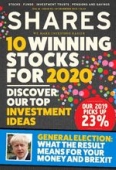Archived article
Please note that tax, investment, pension and ISA rules can change and the information and any views contained in this article may now be inaccurate.
What are the next steps for Brexit?

The big majority secured by prime minister Boris Johnson and the Conservative Party means the UK is almost certain to exit the European Union on 31 January 2020 in an orderly fashion. Attention will then switch to the deal on future trade between the UK and EU.
With a 31 December 2020 deadline, most observers believe there is too short a time frame to agree a trade agreement, raising the prospect of an effective no-deal scenario at the end of the transition period.

With a substantial majority and a large cohort of MPs who will feel significant personal loyalty to the man who helped get them elected, Johnson should have a fairly free hand when it comes to Brexit policy.
M&G Investments’ investment director Ritu Vohora says: ‘Does this majority allow Johnson sufficient leverage to get a good trade deal from Europe? To what extent does the majority allow him the latitude to seek an extension to the transition period if that is what is needed to get a trade deal signed? This would remove one of the last remaining risks that there could be a no-deal rupture at the end of 2020.’
If there is to be an extension to the transition period it needs to be agreed by the end of July 2020 under the terms of the Withdrawal Agreement. Government plans to rule out an extension have raised fears of a new cliff edge for businesses and consumers.
If Johnson is to confound the sceptics and get his trade deal agreed by the end of next year it is likely to be a so-called ‘bare bones’ agreement.
Paul O’Connor, head of Janus Henderson’s multi-asset team, says: ‘That deal would probably involve tariff-free trade in goods but with border checks and non-tariff trade barriers, reflecting the UK’s desire to achieve some form of regulatory independence.
‘It is worth noting that the EU has a sizeable trade surplus in goods with the UK, measured at £94bn in 2018. However, in services, where the UK has run a trade surplus with the EU for over a decade, there is little hope for meaningful progress on establishing new trade relations in 2020.
‘That will leave a large cloud of uncertainty overshadowing more than 80% of the UK economy, which means that this clean-break Brexit will effectively be quite a hard Brexit.’
The question facing the markets is whether Johnson might use his comfortable majority to pivot away from hard-line Eurosceptic MPs and pursue a softer form of Brexit. Early signs suggest this is unlikely.
Important information:
These articles are provided by Shares magazine which is published by AJ Bell Media, a part of AJ Bell. Shares is not written by AJ Bell.
Shares is provided for your general information and use and is not a personal recommendation to invest. It is not intended to be relied upon by you in making or not making any investment decisions. The investments referred to in these articles will not be suitable for all investors. If in doubt please seek appropriate independent financial advice.
Investors acting on the information in these articles do so at their own risk and AJ Bell Media and its staff do not accept liability for losses suffered by investors as a result of their investment decisions.
Issue contents
Editor's View
Feature
- Top performing funds of 2019
- What were the key themes for small caps in 2019?
- Big companies with big decisions to make in 2020
- All change: an unusual period for FTSE 100 CEOs
- Tracking the performance of the biggest emerging markets
- Emerging markets: Views from the experts
- Is inflation really dead and what can investors do if it isn't?
Great Ideas
- Share pick for 2020: IG Design
- Share pick for 2020: Lloyds Banking
- Share pick for 2020: Redrow
- Our 2019 picks have smashed the market with a 23% return
- Share pick for 2020: Luceco
- Four great funds to buy for 2020
- Share pick for 2020: Kainos
- Share pick for 2020: Begbies Traynor
- Share pick for 2020: Hotel Chocolat
- Share pick for 2020: Centrica
- Shares pick 2020: Wizz Air
- Share pick for 2020: Schroders

 magazine
magazine








